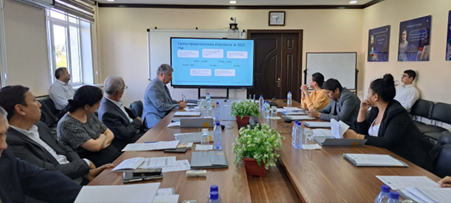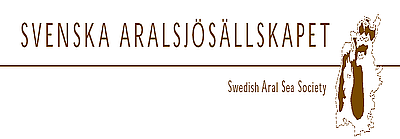Global Water Partnership Central Asia and Caucasus
by Yelysaveta Demydenko*
 National stakeholder consultations on SDG 6.5.1 in Uzbekistan, organized by GWP CACENA in September 2023.
National stakeholder consultations on SDG 6.5.1 in Uzbekistan, organized by GWP CACENA in September 2023.
Global Water Partnership Central Asia and Caucasus (GWP CACENA) unites nine countries – Azerbaijan, Armenia, Georgia, Kazakhstan, Kyrgyzstan, Mongolia, Tajikistan, Turkmenistan, and Uzbekistan, in two main sub-regions: the Southern Caucasus and Central Asia. Established in 2002, GWP CACENA is part of the Global Water Partnership network, set up to be a neutral platform to work with pressing water-related challenges and implementation of Integrated Water Resources Management (IWRM) policies and practices.
The GWP CACENA Regional Secretariat is based in Tashkent, Uzbekistan and is hosted by the International Water Management Institute (IWMI). The Secretariat coordinates the regional partnership’s work and daily functions. The GWP CACENA Regional Council is supported by the Secretariat. In each country there are Country Water Partnerships (CWPs) that work out and implement annual work plans.
In terms of impact, one of GWP CACENA’s biggest strengths lies in building partnerships between countries through its network. In a region with a complicated political landscape and competing water demands, getting different actors around the same table is a great challenge. Being represented in decision-making bodies, organizing capacity building events and regional forums, the regional office helps keep the conversation going between ministries, civil society, academia, and international community. To a larger extent it uses its vast network of country-level partners that already have a trusted relationship established with the decision-makers.
Supporting progress on the Sustainable Development Goals (SDGs), especially SDG 6.5.1, which tracks IWRM implementation at both national and transboundary levels, has been one of the main focus areas for GWP CACENA’s work. In 2023–2024, the regional office has supported the third round of global stock take on SDG 6.5.1 in nine countries. The Country Water Partnerships received support from the SDG 6 IWRM Support Programme to conduct national multi-stakeholder consultations across the region helping countries assess their performance on integrated water resources management. These meetings provided space for open discussions about what’s really missing for the country’s progress: better laws, clearer institutional roles, more funding, or stronger public awareness. While many countries have laid the groundwork for better managing their water resources, actual implementation of these strategies has been slow and uneven. In a number of countries, the budget for water management has been re-allocated to address urgent matters such as food security and disaster preparedness.
GWP CACENA has also helped raise the profile of transboundary water cooperation. A regional workshop convened in Tashkent in 2023, for instance, brought attention to shared groundwater management and the need for more reliable cross-border data exchange, which are both major contentious points in the region. Similar initiatives were carried out to raise awareness about climate risks like droughts and floods. In Uzbekistan, for example, the national drought management plan was developed with GWP CACENA’s support and technical help from the U.S. NOAA. In Armenia, a Drought Community of Practice was launched in 2023 to bring affected stakeholders together to find practical solutions.
Another area where the work of regional office stands out is youth involvement. For the past several years, GWP CACENA has co-organized student competitions with Kazakh-German University, focusing on IWRM and the SDGs. These olympiads, held across Central Asia, are identifying the next generation of water leaders and giving them hands-on exposure to solving water challenges through a project hackathon.
Despite the positive impact, turning ideas into lasting change remains a challenge in CACENA countries. Many of the same issues, such as fragmented governance, insufficient budgets, weak enforcement of existing laws, continue to surface in each round of consultations. Cross-sectoral cooperation is especially difficult. Water policies often remain siloed, with ministries and agencies working in parallel rather than in synergy.
GWP CACENA has helped create space for discussion, but influencing actual decision-making takes time and political will which needs to be supported by a strong team capacity. The external challenges are compounded by internal constraints. The GWP CACENA team is relatively small and operates with limited financial and human resources, which can affect the speed and scope of its delivery. Much of the trust built with national authorities, rests on the shoulders of a few senior experts, many of whom have decades of experience but are nearing or past retirement age. While their dedication and credibility are invaluable, the lack of additional capacity reduces the organization’s agility and risks missed opportunities. Furthermore, the governance model, with the Secretariat hosted by another institution, can create complications in fundraising and programme development, limiting GWP CACENA’s ability to independently mobilize resources and establish relationships with local partners. Geopolitical dynamics in Central Asia are also evolving. Countries in the region are increasingly seeking to strengthen cooperation on shared water challenges, but with a preference for locally led solutions and limited involvement of external actors. This presents both an opportunity and a constraint, since while the interest for regional dialogue is growing, organisations like GWP CACENA must act carefully to remain seen as neutral, trusted, and truly regionally owned. Addressing internal challenges will be key to maintaining relevance and scaling up their impact in a rapidly changing political landscape.
CACENA’s impact could be even greater if it finds ways to engage more directly with high-level decision-makers and help countries move from assessments to concrete policy shifts. There’s also untapped potential in playing a matchmaker role by linking national efforts with global funding opportunities, such as climate finance, to support long-term water infrastructure and planning.
In short, GWP CACENA plays a valuable role in strengthening water governance across Central Asia and the Caucasus. The next step is to build on the foundation by addressing internal constraints to help countries progress from talking about integrated water management to truly putting it into practice.
Global Water Partnership (GWP) is a global network working to dedicated to improving water governance and mobilising climate-resilient investments for a sustainable and equitable future. Founded in 1996, the network consists of over 2,800 partner organizations across 182 countries and operates through 13 regional and 77 country water partnerships.
The intergovernmental organization Global Water Partnership Organisation (GWPO), which serves as the secretariat for the network, was established in 2002 by several countries and organizations, including Sweden, together with the World Bank, the World Meteorological Organization (WMO), and the Netherlands, Denmark, Chile, Hungary, Jordan, Pakistan, and Argentina. GWPO’s Global Secretariat is based in Stockholm (currently transitioning to South Africa) and has long served as the hub for GWP’s global programs, partnerships, and advocacy efforts.
In the past year, GWPO has entered a period of transition. Following a shift in the Swedish government’s development cooperation priorities, SIDA has revised its multi-year funding agreements which resulted in significant reduction of core funding to many Swedish organizations. These changes also influenced the Government of Sweden’s decision to no longer serve as host of GWPO Secretariat in Stockholm. Similar changes in Dutch development policy have also affected the funding situation. In response, GWPO has launched a transformation process to identify a new host country and to adapt its governance and operations to reflect changing donor landscapes, particularly in Northern Europe.
These shifts reflect a broader reorientation of Sweden’s engagement in development cooperation. The Stockholm International Water Institute (SIWI), which previously played a central role in Sweden’s approach to international water cooperation, has also been impacted by these changes and withdrawal of SIDA funding. As a result, SIWI suspended its international programmes and now focuses on World Water Week, the Stockholm Water Prize, and a limited set of Swedish-focused activities. A new Director and Governing Board are developing a revised strategy, which will be crucial for re-engaging in international work and restoring partnerships with donors.
- Yelysaveta Demydenko has previously worked with water management and climate-related projects in Central Asia at the GWP Secretariat in Stockholm between 2020–2025. She is currently a board member of the Swedish Aral Sea Society.
Download the article: GWP in Central Asia and Caucasus in pdf-format.


